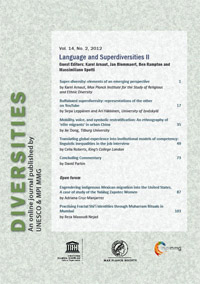Mobility, voice, and symbolic restratification: An ethnography of ‘elite migrants’ in urban China
by Jie Dong (Tilburg University)
To cite this article: Dong, J. (2012). Mobility, voice, and symbolic restratification: An ethnography of ‘elite migrants’ in urban China. Diversities, 14(2), 35–48. https://doi.org/10.58002/egex-s924
In this paper I explore class (re)stratification of the contemporary Chinese society through the use of various semiotic resources by a group of ‘elite migrants’ who are highly mobile within the country as well as globally. I identify two sets of semiotic resources and argue that they are different forms of voice articulating the different angles and directions of class distinction. The first set of resources are external criteria of group membership, expressed by their control of languages – Putonghua and English – that are not tied to one place but offer the mobility that characterizes their social class. The second set of resources are internal criteria of membership (‘mensao’) connected to and predicated on knowledge of particular consumption commodities. The fieldwork data demonstrate a multidimensional complex of voice, internal as well as external and with several scales being oriented towards. Through these resources the elite migrants create an identifiable ‘middle class’ voice in contemporary China.
|
